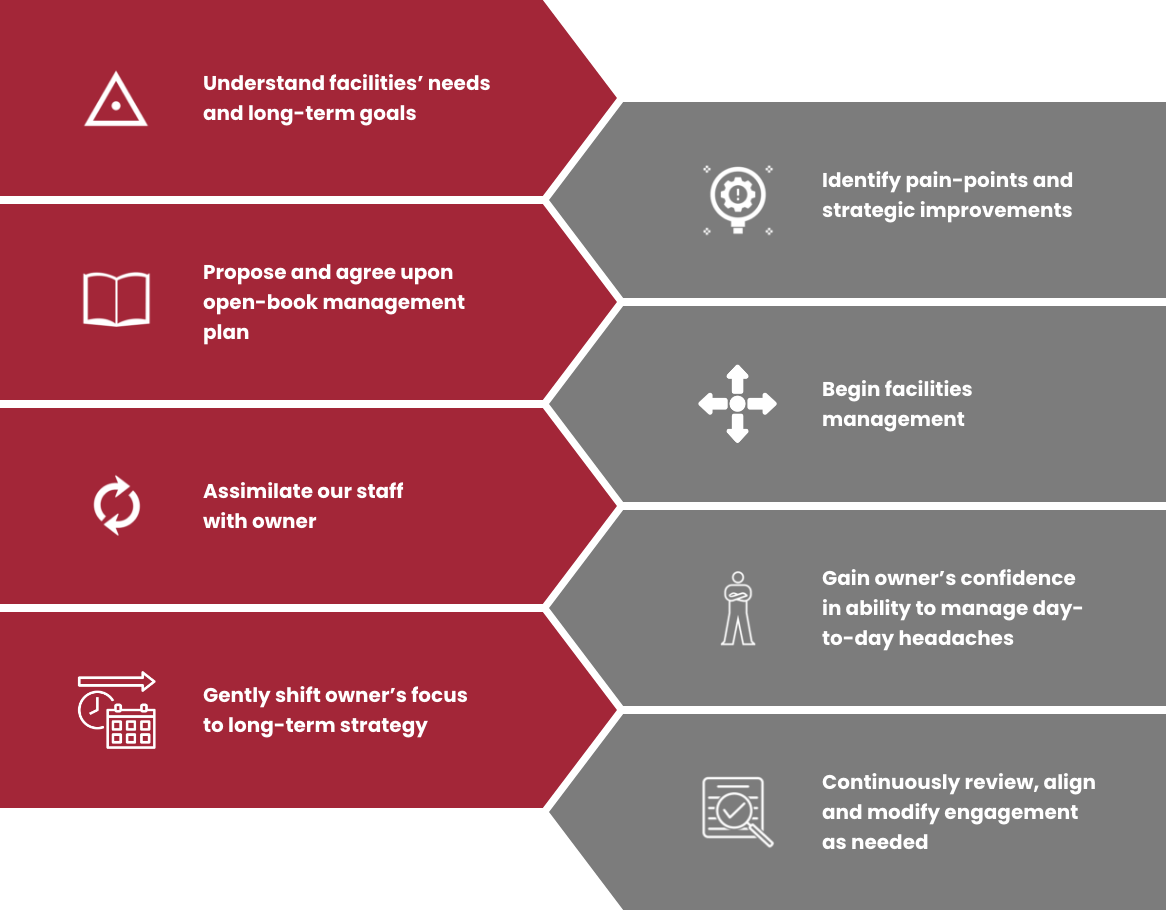The Duty of Facility Management in Sustainable Operations
The Duty of Facility Management in Sustainable Operations
Blog Article
Trick Trends Shaping the Future of Center Monitoring in 2024
As we look ahead to 2024, the landscape of facility management is positioned for considerable improvement, driven by a number of essential trends. The combination of clever structure innovations and a shift towards data-driven decision-making promise to enhance functional effectiveness while prioritizing sustainability in practice.
Smart Building Technologies

Smart building innovations include a broad selection of systems, consisting of smart illumination, a/c controls, and safety systems. By incorporating these systems, center managers can keep an eye on and readjust specifications in real-time, bring about substantial decreases in energy waste and functional costs. Clever sensing units can identify occupancy levels and adjust lights and temperature level as necessary, making sure that energy is just utilized when necessary.
Moreover, these technologies help with enhanced data collection, permitting companies to track usage patterns and identify chances for more enhancements. The application of clever structure innovations not only adds to sustainability goals but additionally develops healthier workplace that can enhance employee productivity and fulfillment.
As we relocate right into 2024, the adoption of smart building modern technologies will likely accelerate, mirroring a more comprehensive change towards more intelligent, receptive, and lasting facility monitoring techniques.
Data-Driven Choice Making
Significantly, companies are leveraging data-driven choice making to enhance facility management practices. By using data analytics, facility managers can derive actionable understandings that substantially improve operational performance and source allocation. The integration of advanced modern technologies, such as IoT sensors and real-time tracking systems, makes it possible for the collection of huge amounts of data on building efficiency, occupancy prices, and power consumption.
This wide range of information allows center supervisors to recognize fads, predict maintenance demands, and proactively address issues before they intensify. For example, anticipating analytics can forecast tools failures, decreasing downtime and fixing costs. In addition, information visualization tools promote better interaction amongst stakeholders, ensuring that informed choices are made collaboratively.
Moreover, data-driven approaches enhance calculated planning by enabling center managers to evaluate the performance of current techniques and make educated choices pertaining to financial investments in modern technology or facilities. As companies increasingly prioritize operational excellence, data-driven decision making is positioned to end up being a keystone of successful center management strategies in 2024 and past. Inevitably, the capacity to utilize data efficiently will encourage companies to produce more efficient, productive, and resistant facilities.
Sustainability and Environment-friendly Practices
The focus on data-driven choice making normally aligns with the expanding emphasis on sustainability and environment-friendly methods within facility management. As organizations increasingly focus on ecological obligation, center supervisors are leveraging analytics to maximize resource usage, reduce waste, and lessen carbon impacts. This strategic technique allows the integration of energy-efficient systems, such as LED lighting, smart HVAC controls, and renewable resource sources right into center operations.
In addition, the execution of sustainable practices extends beyond energy intake. Center supervisors are promoting and adopting environmentally friendly materials reusing efforts to develop a round economy within their centers. This not only boosts the anonymous ecological profile of the organization yet also cultivates a society of sustainability among employees.
Compliance with ecological policies is another essential element driving the adoption of green techniques. By using information analytics, facility managers can keep an eye on conformity metrics and determine areas for enhancement, making certain adherence to worldwide and local sustainability criteria.
Hybrid Work Versions
A substantial shift towards hybrid job versions is improving the landscape of facility administration in 2024. This standard incorporates in-office and remote work, demanding a reevaluation of area application, source allowance, and employee involvement approaches. Organizations are increasingly recognizing the significance of adaptable workspaces that provide to diverse demands and Facility Management preferences.
Center managers should adjust by executing flexible office designs that sustain collaborative initiatives while supplying locations for concentrated job. This includes the combination of technology to facilitate seamless communication and cooperation among in-office and remote workers. Smart building options, equipped with analytics and sensors, permit real-time monitoring of space use, making it possible for organizations to optimize their atmospheres effectively.
Moreover, crossbreed work versions emphasize the demand for effective facility monitoring that focuses on worker experience. In significance, the hybrid work model is changing center management, urging an aggressive method to satisfy the developing needs of the labor force.
Enhanced Owner Health
As companies welcome hybrid work designs, an increased concentrate on resident health is ending up being integral to center management methods. Facility Management. This shift identifies that a healthy and satisfied labor force straight influences productivity and retention prices. Facility managers are now focusing on environments that advertise physical and mental well-being, incorporating aspects such as all-natural illumination, biophilic style, and accessible wellness resources

Technology plays an essential role in this view publisher site advancement. Smart building systems can keep an eye on ecological elements and adjust settings in real-time, ensuring ideal convenience levels - Facility Management. Furthermore, responses devices, such as occupancy sensing units and staff member studies, allow center managers to consistently refine wellness campaigns based on resident demands.

Verdict
In 2024, the future of center management will be substantially affected by the assimilation of clever structure innovations and data-driven decision-making, promoting boosted operational efficiency. These fads jointly highlight the advancing landscape of facility management in reaction to contemporary obstacles and possibilities.
Center managers are advertising and embracing green materials recycling campaigns to produce a circular economic situation within their facilities.A substantial shift in the direction of crossbreed job designs is reshaping the landscape of center management in 2024.Additionally, crossbreed job models highlight the demand for efficient center administration that focuses on employee experience.As companies welcome hybrid work models, a heightened emphasis on owner wellness is coming to be essential to facility monitoring approaches.In 2024, the future of center management will be significantly influenced by the combination of wise structure technologies and data-driven decision-making, fostering boosted functional effectiveness.
Report this page